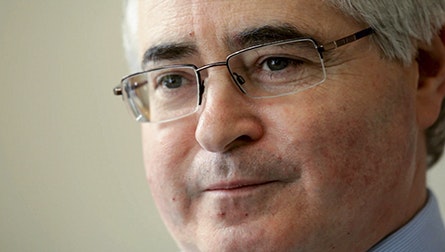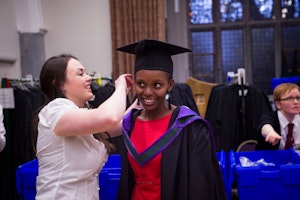Disability Rights: An Important Test for Open Society
By Gerard Quinn

Gerard Quinn directs the Centre for Disability Law and Policy at the National University of Ireland Galway and is a member of the Open Society Foundations’ Human Rights Initiative advisory board. It is one of only a handful of institutions in Europe that specializes in disability rights.
Studying legal history, international law, and civil rights law in the 1980s, I never had the faintest idea that I would end up applying that body of knowledge to something like disability rights. Then I became a father. My oldest daughter was born with a disability. This was right around the time that President George H. W. Bush signed the Americans with Disabilities Act into law. Living in Ireland at the time, I remember thinking to myself, we can do that in Europe too. I went on to become a civil servant on the European Commission, in charge of drafting the EU’s policy on disability. From there I wound up getting involved in the treaty drafting process on the UN Convention on the Rights of Persons with Disabilities.
One thing that completely fascinates me is how to translate an idea into practical law that can change lives. As we work to turn the Convention into EU laws and policies, we must make sure that its implementation works in the European context. But I also keep bringing it back to “what would this mean for my daughter, what would this mean for people who are similarly situated?” That’s my reality check day in and day out. My personal experience has never detracted from my objectivity. In fact, having a daughter with a disability gives me a sharpness that it I might otherwise lack when trying to turn a human rights standard into law.
While we focus on trying to make the Convention have meaning in people’s lives, truth be told, our culture has yet to really change. For example, there’s an important distinction between integration and inclusion. Integration is the spatial image of placing a person in some place, time, and space, whereas inclusion is much more about social connectedness. We must consider why our communities are so exclusive. What can we do to transform community life in order to create space for people with disabilities to belong? When you think about it, social connectedness is exactly the thing that has been stripped away from people with disabilities, especially people with intellectual disabilities.
When you put the word disability to people, they subliminally think less human, less able, less worthy, less able to contribute. Because of this, there’s a lot of untapped potential out there. People don’t generally connect disability with human rights. And I often think our most important task is to communicate this deep connection and get beyond cultural blockages. To get people to see disability not as a social welfare issue, not as a charity issue, not as an issue of pity or revulsion, but as a mainstream issue that affects everyone in society.
An important test of an open society is whether or not people with disabilities are actually included in the mainstream. Working on disability rights in societies that are not fully open, can help open up space to work on many other issues. For example, as you raise the expectations of parents about the inclusion of their children in the education system, you’re helping to raise expectations around a whole host of other issues like ensuring that as their children grow in adults they can assume productive lives and also be agents of their own change in the democratic process. From that point of view, I see the disability issue almost as a vanguard in creating open societies. It makes people face the mirror, and face the contradiction between their professed universal values and how they’re actually implementing them on the ground.
The Convention is really a blueprint for a worldwide process of law reform. It is the kick start we need to bring about real change. But it’s not going to happen unless that law reform is tailored to the realities of local environments whether Mozambique or Ireland or Mexico. It’s really important that academic institutions like the Centre for Disability Law and Policy at the National University of Ireland Galway evolve throughout the world. They are essential if we are to translate the majestic generalities of the Convention into something more meaningful in these countries. We need a new generation of policy entrepreneurs to bring about change. Until all people are made to feel that they belong and have a stake how can we say we have open societies?
Until February 2016, Gerard Quinn was a member of the Human Rights Initiative Advisory Board.
